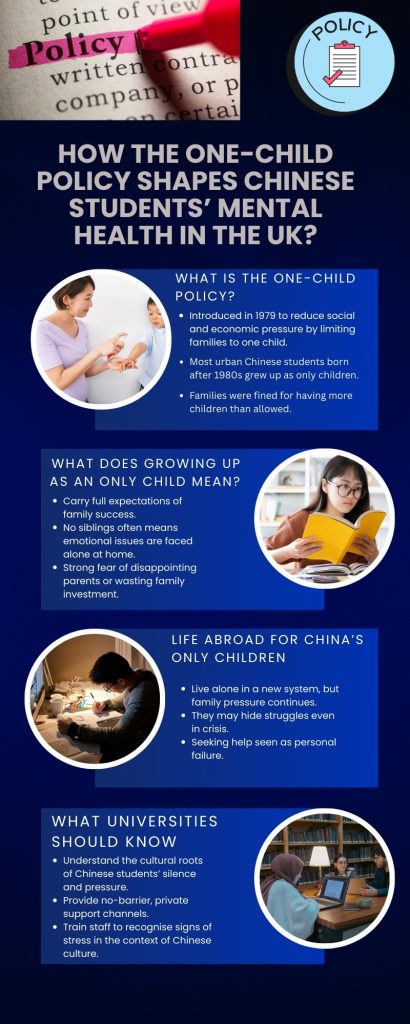Research shows that only one third of Chinese students in the UK with mental health issues seek support services. Why does this happen, and what should universities do to support them?

In the second week after arriving in London, something disturbing happened to QiQi, a Chinese student at SOAS, University of London. A male student in her student accommodation began following her, and it made her feel afraid and helpless.
The harassment had a serious impact on QiQi’s mental state. She already had a history of depression in China, and facing such a situation so early in her time abroad made her feel unlucky. However, QiQi did not ask for support until halfway through the term, when she could no longer cope.
“Later I thought the reason I did not report my mental health history to the university immediately was that, during my undergraduate studies in China, I had tried to get mental health support but faced discrimination. That experience made me feel ashamed about having depression,” she says.
Although disclosure of mental health issues has increased overall among undergraduates, racially minoritised students, including international students, are less likely to seek help than those from majority groups, according to an article published in BMC Public Health in 2025.
Among international students, Chinese students are a separate group. An article from NIHR Open Research shows that Chinese students are less likely to seek formal mental health services than British students.
The use of GP services by Chinese students is an example. “I remember when I was doing research, I found that some Chinese students had not registered with a GP, so in a way they did not exist in the system,” says Dr. Erla Magnusdottir, who previously worked at King’s College London, “This percentage was higher than other students, and even higher than other international students who had not registered with a GP.”
For many Chinese students, seeking help is linked to stigma. In Chinese culture, this stigma is strongly tied to the sense of shame, according to the research from Dr. Magnusdottir.
Mental health problems may bring shame to the individual and also affect the reputation of the family, This cultural understanding leads many people to avoid seeking professional support for fear of losing face, according to a systematic review on Asians and mental illness stigma published on ScienceDirect.
This feeling of shame also leads many Chinese parents to avoid telling others about their children’s situation. “I have had depression for about five years. But my parents would not tell relatives that I had depression. They would just say that I had a heart problem and needed rest,” says QiQi.
Apart from stigma, Chinese students often face pressure from their parents’ expectations.
Parental expectations are one of the reasons why Chine.se students choose to study in the UK, according to an article published in 2024 on Springer Nature Link. These expectations are not only about their children’s studies but also about their future careers.
Expectations from family may also shape how students understand mental health. Some Chinese students see having a mental health problem as a form of failure. They feel shame about it and worry that it may affect their studies or future. This pattern is reflected in academic research and expert observations. “From what I found in my research, Chinese students often view mental health struggles as a kind of failing,” says Dr. Magnusdottir, “Based on what I found, one possible reason is that there was a lot of pressure coming from home.”
One reason for the pressure from families is that many Chinese students are only children. Their families often expect a return on the investment in overseas education, and some students feel that pressure. “Many of the students, although this will be changing now, are still from the one-child policy generation. It felt like there were grandparents and parents who had made a lot of sacrifice for them to study abroad. There was this sense that they couldn’t let their families down,” says Dr. Magnusdottir.

China introduced the one-child policy in 1979 to control population increase and reduce possible problems in society and the economy, the policy had more success in urban areas than in rural regions, according to an article published by the British Medical Journal (BMJ) in 1999. The policy tried to stop families from having more than one child by limiting second births and stopping third or later births.
In the past few decades, China has raised a large generation of only children due to its one-child policy. By 2014, the number of only children in China had reached nearly 140 million, according to an article from The Guardian in 2015. Many of them are known as Little Emperors, a term often used to describe this group.
As a result, these students often grow up with strong pressure to succeed. Chinese students face specific pressure due to the one-child policy, as parents gave more motivation, energy, and money to their only child’s future, according to an article published in PLOS One in 2015.
These pressures may also explain why some Chinese students are not willing to seek mental health support. Asking for help may feel like admitting failure to the families who have invested so much in them.
However, the pressure from family expectations does not always lead to mental illness, but it can affect how students feel about their daily life and studies.
Some Chinese students feel unhappy with their university life. They experience pressure from family, and continue studying even when the subject was not their own choice or interest. “Maybe one finding I found is that quite a few students just weren’t actually having a good time. They weren’t enjoying their studies. They felt this pressure. Maybe they were studying something they hadn’t chosen or weren’t interested in, but they were still continuing,” says Dr. Magnusdottir.
Family pressure and stigma are not the only barriers. For some Chinese students, language is another major reason that prevents them from seeking help when they need it. Chinese international students in the UK list language barriers among the main acculturative stressors affecting their wellbeing, according to an article from Frontiers in Education in 2024.
Language barriers can reduce the effectiveness of international students’ use of mental health services, as some students have limited English skills, according to an article published on the PubMed Central in 2024.
“Language is a major reason why some Chinese students don’t seek support. One finding was that language may pose more challenges than is often understood,” says Dr. Magnusdottir, “Many Chinese students were almost a bit shocked at how hard it was, because they had taken English exams, passed, and done well, but it was a very different story to operate in English every day. So language definitely played a huge role.”
For students themselves, the struggle with language can be even more immediate. “When I wanted to seek mental health support, I hoped to explain my situation in my own language. This helped me express myself more clearly. I only looked for Chinese-speaking therapists on social media when I was feeling bad because I did not want to spend extra energy translating my feelings into English,” says Lingjia Zhong, a Chinese student from the University of Bristol.

Other students also share similar experiences. “I think one major reason why Chinese students do not want to seek mental health support is that they do not feel confident about their English. A Chinese classmate once asked me if he could pay me to go with him to the NHS to register and help translate the conversation,” says QiQi.
Even when Chinese students seek mental health support, language barriers can still affect how well they are understood. “Sometimes I feel afraid that I might scare them,” says Zhong, “When I try to explain my experience in English, I find it hard to choose words with the right weight. For example, my parents have said things to me that hurt me, but I do not know which word to use. If I use a word like torture, the doctor may think I have been abused.”
While these barriers help explain why many Chinese students do not seek help, they also highlight the need for universities to reduce such obstacles and offer support that is more accessible and effective.
These challenges of Chinese students suggest that universities must improve their approach. “I would say that university staff need better training in terms of understanding where they are coming from,” says Dr. Magnusdottir.
This call for better training is supported by research. Mental health services should be shared clearly across the campus, and staff should receive training to identify and respond to the needs of international students, according to an article published on the PubMed Central in 2024.
Language barriers cause many problems for Chinese students, so they need to be a main focus for universities in the UK to address. “I think one of my recommendations was that universities need to be better at making sure they have counselors who speak Chinese. They also need to have materials in Chinese,” says Dr. Magnusdottir.
“Students are tired. It’s hard work. They come here and do all their studies in English. At the end of the day, if there’s something they don’t have to read, like an information pamphlet, they won’t read it. It’s just too hard,” she adds.

In addition, language is not the only area where students feel unsupported. Research also points to the mentoring. “I think also for the mentors, I remember there was a bit of a gap, in that students were not using their mentors, and it had something to do with the way the university’s pastoral care is set up,” says Dr. Magnusdottir.
Mentoring programs exist at many UK universities, but research shows that Chinese students do not always benefit from them. They report issues such as limited mentor availability, questions about mentor qualifications, and ineffective pairing between mentors and mentees, according to an article from Frontiers in Education in 2024.
This situation is also noted by experts. “From one study that I read, the Chinese students weren’t really using the mentor relationship, because they had to be quite proactive, and the problem is that they may often be reluctant to approach their mentors,” says Dr. Magnusdottir.
She suggests UK universities need to make mentoring more active and supportive, rather than leaving students alone. “So if students are having a hard time, the mentor needs to try to build a relationship with them. If they see the student isn’t coming, they need to reach out in some way, because this is a big step for the student,” she says.
However, problems can begin much earlier, during the application stage. In China, the application process may often be handled by agencies, and the students are not very involved, according to Dr. Magnusdottir. “I found from researching that the student lost a bit of an opportunity because the agency had done so much of it. They were just maybe focusing on their English language test. It was almost like being thrown into the deep end,” she says.
This is a loss for Chinese students, and UK agencies should make some changes to help them take part more effectively. “That was quite a bit of a jump. My recommendation would be to be cautious with the use of agencies. And maybe these agencies need to take some responsibility. They should find ways to engage the student better in the whole process,” says Dr. Magnusdottir.
